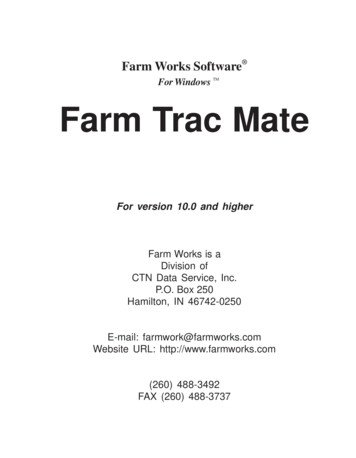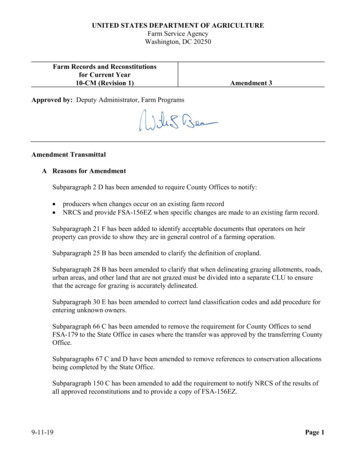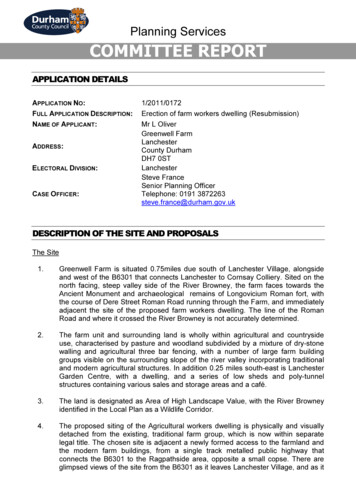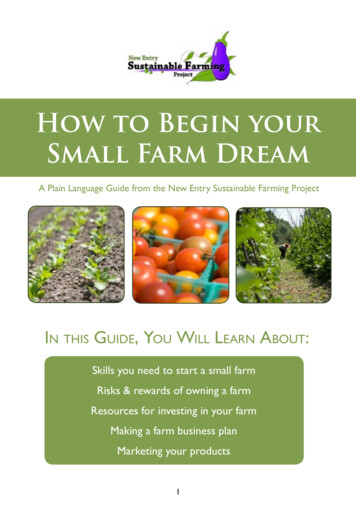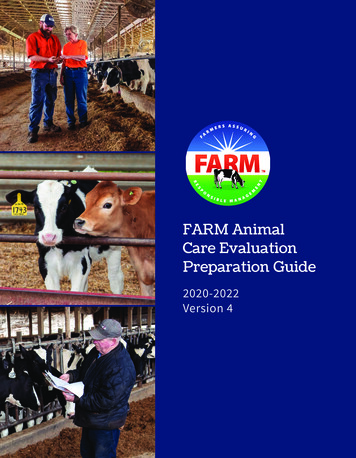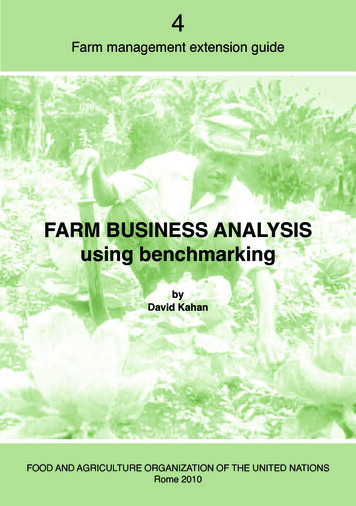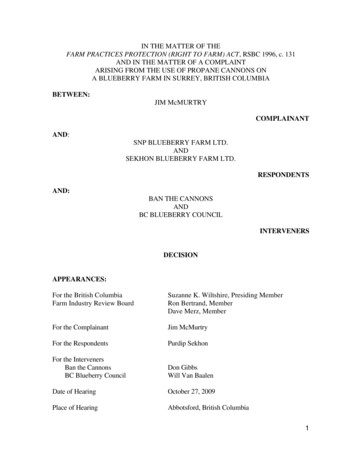
Transcription
IN THE MATTER OF THEFARM PRACTICES PROTECTION (RIGHT TO FARM) ACT, RSBC 1996, c. 131AND IN THE MATTER OF A COMPLAINTARISING FROM THE USE OF PROPANE CANNONS ONA BLUEBERRY FARM IN SURREY, BRITISH COLUMBIABETWEEN:JIM McMURTRYCOMPLAINANTAND:SNP BLUEBERRY FARM LTD.ANDSEKHON BLUEBERRY FARM LTD.RESPONDENTSAND:BAN THE CANNONSANDBC BLUEBERRY COUNCILINTERVENERSDECISIONAPPEARANCES:For the British ColumbiaFarm Industry Review BoardSuzanne K. Wiltshire, Presiding MemberRon Bertrand, MemberDave Merz, MemberFor the ComplainantJim McMurtryFor the RespondentsPurdip SekhonFor the IntervenersBan the CannonsBC Blueberry CouncilDon GibbsWill Van BaalenDate of HearingOctober 27, 2009Place of HearingAbbotsford, British Columbia1
INTRODUCTION1.The respondents, SNP Blueberry Farm Ltd. and Sekhon Blueberry Farm Ltd., conductblueberry farming operations in Surrey, British Columbia on farm sites running alongthe south side of Highway #10 on either side of 168 Street in west Cloverdale. SNPBlueberry Farm Ltd. is owned by Mr. Karnail Sekhon, Mr. Himmat Sekhon and theirrespective wives. Sekhon Blueberry Farm Ltd. is owned by Mr. Baldev Sekhon andhis wife. The blueberry farming operations in this location are collectively referred toas the Sekhon blueberry farm in this decision. The farm sites are located in theAgricultural Land Reserve and zoned agricultural.2.The complainant, Mr. Jim McMurtry, lives to the north of Highway #10 on 167 Streetin Surrey in a residential subdivision. His residence is located some 350 metres fromthe nearest blueberry field edge and at an elevation approximately 20 metres higherthan the field. He complains that noise resulting from the Sekhon blueberry farm’suse and management of propane cannons makes living in his otherwise quietneighbourhood very difficult from 6:30 a.m. to 8:00 p.m. every day for three monthsof the year.3.The complaint was received by the British Columbia Farm Industry Review Board(BCFIRB) on July 14, 2009. The complaint alleges that the propane cannons on theSekhon blueberry farm are not being operated in compliance with provincialguidelines.4.The respondents’ position is that their use of propane cannons as part of the birdpredation management practices of the farm is in keeping with normal farm practiceand in compliance with the Farm Practices Protection (Right to Farm) Act RSBC1996 c. 131 (the Act).5.BCFIRB retained Mr. Mark Sweeney, P.Ag., Berry Industry Specialist, Ministry ofAgriculture and Lands, as a knowledgeable person pursuant to section 4 of the Act.Mr. Sweeney conducted a site visit on September 25, 2009. He then prepared a report(KP report) assessing the bird predation management practices on the two farm sites,and in particular the operation of propane cannons. His report was issued to theparties on September 28, 2009.6.The Ban the Cannons group and the BC Blueberry Council were each grantedintervener status. The Ban the Cannons group was represented by Mr. Don Gibbswho provided a written submission in support of the complainant. The BlueberryCouncil, represented by Mr. Will Van Baalen, Executive Director also provided awritten submission with respect to its position regarding predatory bird managementon blueberry farms in the lower mainland of British Columbia.7.The complaint was heard in Abbotsford on October 27, 2009. Mr. Sweeney wasqualified as an expert witness in the area of bird predation management and blueberryfarming operations in the Fraser Valley and testified with respect to his report. Mr.McMurtry, the complainant, testified. Mr. Purdip Sekhon, who also acted as the2
representative for the respondents, and Mr. Tom Baumann were witnesses for therespondents.ISSUE8.Does the noise arising from the propane cannon use and management practices on theSekhon blueberry farm result from normal farm practice?BACKGROUNDMinistry Guidelines9.The British Columbia Ministry of Agriculture and Lands has published a set ofguidelines for the use of audible bird scare devices in south coastal British Columbia.The guidelines, first adopted in 1996, have been the subject of revisions over theyears.10.At the onset of the 2009 blueberry growing season in late June/early July, the June2008 version of the guidelines continued to be the most current.11.However, in early 2009 BCFIRB had commenced a review of the use and regulationof propane cannons in the south coastal region pursuant to section 11(2) of the Actand conducted several consultation sessions with stakeholder groups with an interestin the issue. While BCFIRB published its report1 on its review of the use andregulation of propane cannons in May 2009, BCFIRB’s recommendations for furtherrevisions to the guidelines were not incorporated by government into the guidelinesuntil August 2009.12.Thus, the 2009 growing season represents a transition period from the June 2008version of the guidelines to the August 2009 version of the guidelines.13.The August 2009 version of the Ministry guidelines2 is attached as Appendix 1.1British Columbia Farm Industry Review Board Review of the Use and Regulation of Propane Cannons inthe South Coastal Region, March 12, 2009 www.firb.gov.bc.ca/reports/Propane/09 May PropaneCannonReview.com2Ministry of Agriculture and Lands Farm Practices South Coastal BC Wildlife Damage Control, August2009, at pp. 3 and 4 ivity/870218-59 Wildlife Damage South BC.pdf3
British Columbia Blueberry Council14.The BC Blueberry Council’s written submission provides information as to itsactivities and efforts in relation to bird predation management issues and the use ofpropane cannons.15.The Council works closely with growers to educate them in the proper use of propanecannons, to educate and encourage growers to use an integrated pest managementapproach in controlling bird predation and to encourage growers to follow theMinistry guidelines.16.The Council responds proactively to complaints and works hard to find solutions tobird management issues. It does so by employing a liaison officer, Mr. Nazam Dulat,from May 15 to October 1 each year to respond to any complaints regardingcontraventions of the guidelines. It also invests in research to find alternate methodsand techniques of bird management to augment propane cannons in an effort toreduce grower reliance on noise deterrents.Farm Operations17.The Sekhon blueberry farm sites of interest in this complaint are located on both sidesof 168 Street along the south side of Highway #10. The number of homes in the westCloverdale area has greatly increased with many new subdivisions north of Highway#10. There has also been a change in the type of farming in the area from mostlyvegetables to blueberries.18.The Sekhon farm site to the west of 168 Street, referred to by the respondents and inthis decision as farm site #2, is approximately 40 acres. This site is planted to an earlymaturing variety and the plants are nearing full maturity. Cannons were probably firstused on this site in 1996 which was the first harvest year.19.The Sekhon farm site to the east of 168 Street, referred to by the respondents and inthis decision as farm site #4, is approximately 75 acres. This site is planted, runningfrom east to west, to 3 varieties: one-third early maturing; one-third maturing midseason; and, one-third which is a late variety. It is a relatively young blueberry fieldin its second year of cropping.20.Bird Predation Management Plans dated June 29, 2009 were provided toMr. Sweeney for each of the sites of interest. The plans name Mr. Rajinder S.Cheema as the contact person for the farms and provide a telephone number. Theyinclude a map showing areas of severe bird pressure and list the type and number ofbird control devices to be utilized in predation management on each site.21.The propane cannons and other devices were deployed in the fields about July 1,2009. The propane cannons were operated at the maximum frequency indicatedunder the guidelines.4
Knowledgeable Person22.Mr. Sweeney is familiar with blueberry farm operations in the lower mainlandgenerally and the Sekhon blueberry farm operations in particular, having visited bothfarm sites on several occasions over the years. He had visited the farm sites duringharvest on July 15, 2009 in addition to his September 25, 2009 site visit. He also metwith Mr. Dulat a few days after his site visit and his report records the informationMr. Dulat provided.COMPLAINANT’S SUBMISSIONS23.The complainant submits that he is aggrieved by the constant bombardment of noisefrom the firing of propane cannons on the Sekhon blueberry farm. The complainantstates that for approximately the last six years he, his family and his neighbours havefound it difficult to live alongside the noise from the propane cannons used on theSekhon blueberry farm, which is the closest blueberry farming operation to hisresidence. He says the constant noise has affected his health and the health of hisfamily.24.The complainant alleges that the Sekhon blueberry farm propane cannons wereoperated outside the parameters of the Ministry guidelines in the following respects: Frequency of firing – Some cannons have been firing at a frequency inexcess of that specified in the guidelines. Cannon repositioning – The cannons are not moved every four days ascalled for in the guidelines and some cannons are stationary. Cannon direction – Cannons are directed to the north toward the power linesalong Highway #10 and therefore toward the complainant’s subdivision,intensifying the sound. Bird pressure and monitoring – The cannons were operated when there wasinadequate bird pressure and damage to justify their use. Cannon concentration – While the total number of cannons appeared to bewithin the overall density specified in the guidelines, there were morecannons in operation than reported and the cannons tended to beconcentrated in certain areas contrary to the guidelines.Time of operation – In late June or early July one cannon fired continuouslyfor two nights until Mr. Dulat was free to come and reset it. Cannons havealso continued firing during the noon to 3 p.m. pause. Contact information – The complainant said he was informed by Mr. Dulatthat there was no contact address or phone number on the cannons.5
25.The complainant submits that the Ministry guidelines establish what is normal farmpractice in this case.26.The complainant says that the respondents’ use and operation of the propane cannonsis not in accordance with normal farm practice because the cannons on the Sekhonblueberry farm are not operated in compliance with the Ministry guidelines.27.The complainant submits that the August 2009 guidelines enshrine the principle thatcannons are to be used only when justified by bird pressure. He argues that the failureof the respondents to keep a written log of their monitoring of bird presence andpressure is evidence of their failure to comply with the guidelines as is the constantfiring of the cannons in the absence of any birds. He also submits that the constantfiring of the cannons is not normal farm practice and that it results in the birdsbecoming habituated to the sound.28.The complainant submits that there is also a need for someone to monitor compliancewith the guidelines. While Mr. Dulat is helpful in this regard, he cannot do it alone.SUBMISSION OF BAN THE CANNONS29.The Ban the Cannons Group provided a written submission in support of thecomplainant. The group submits that the complaint is typical of situations that manyof its members experience in the lower mainland area. The group seeks greaterrestrictions on the use of propane cannons in the west Cloverdale area and theapplication of the restrictions to all users of propane cannons across the lowermainland.30.Ban the Cannons submits that there are so many blueberry farms in the area and somany cannons firing that it is difficult to determine if any one cannon is firing withinthe frequency limits set out in the guidelines and to police their use in accordancewith the guidelines. While Mr. Dulat has been somewhat helpful, his impact has beeninsignificant because of the sheer number of blueberry farms and cannons being used.Municipal bylaw support is ineffective and bylaw officers in Surrey simply refer allcomplaints to the BC Blueberry Council.31.The group agrees that an integrated approach must be used to deter birds and that anumber of alternatives are necessary. However, it submits that cannons should not bean alternative in more populated areas and should be phased out in such areas.Growers should not rely to the extent they do on propane cannons and cannons shouldnot be used as the dominant device to protect the crop as is the case on the Sekhonblueberry farm and many other farms in the area.32.Ban the Cannons also submits that cannons have limited effectiveness because birdshabituate to the noise, in particular when cannons fire at regular intervals.6
33.Ban the Cannons’ view is that the new guideline recommendation that cannons onlybe used when birds are present has much potential for reducing blast count in an areasuch as west Cloverdale. However, the group submits that as written the guidelinesprovision will be difficult to monitor and needs to be more specific and be given some“teeth”. It makes several suggestions, including that cannons not be startedautomatically every morning on automatic timers, not be run all day long and not beleft firing unattended but that active monitoring be required.RESPONDENTS’ SUBMISSIONS34.Mr. Purdip Sekhon, a Sekhon family member and its representative, submits that theuse of propane cannons as part of the bird predation management practices of theSekhon blueberry farm is in keeping with normal farm practice. He argues that therespondents follow the Ministry guidelines and that there have been only two to threeproblems over the years and all were corrected.35.Mr. Sekhon identifies bird pressure as the main point in issue. He submits that thepresence of birds and bird pressure is site specific. He argues the evidence, inparticular that of Mr. Baumann and the farm’s packer, establishes the presence ofbirds and bird pressure. Because the complainant may not have seen birds, it does notmean birds are not present. He submits that the respondents would not use thepropane cannons if they did not need to in order to protect the crop in response to birdpressure.36.With respect to the keeping of a written log, Mr. Sekhon submits that it is not aviolation of the guidelines to fail to keep a log.37.Mr. Sekhon submits that the use of propane cannons in combination with other tacticsand devices to scare birds is part of normal farm practice in blueberry farming. Hesubmits that the respondents, who were among the first farmers to produceblueberries in the Cloverdale area, have improved their bird predation managementtechniques over the years. However, the respondents’ use of propane cannons isnecessary to protect the crop from bird damage.SUBMISSIONS OF THE BC BLUEBERRY COUNCIL38.The Council submits that propane cannons are a proven and effective method of birdcontrol especially when rotated within the field and when other scare tactics aredeployed. The Council agrees starlings can habituate to any one method if usedsolely. The Council notes that bird pressures vary considerably between fields.Growers need to continually assess and adjust their bird management plan; no onedevice is a solution, but all are required to adequately protect crops.7
ANALYSIS39.The complaint was filed pursuant to s. 3(1) of the Act. That section provides asfollows:3(1) If a person is aggrieved by any odour, noise, dust or other disturbanceresulting from a farm operation conducted as part of a farm business, theperson may apply in writing to the board for a determination as to whether theodour, noise, dust or other disturbance results from a normal farm practice.40.A complaint under the Act involves a two-step analysis.41.The panel accepts that the complainant has satisfied the first step of establishing thathe is aggrieved by noise as a result of the operation of propane cannons on the Sekhonblueberry farm.42.Once the initial step has been satisfied, the panel must go on to make a determinationas to whether the grievance results from a normal farm practice.43.Section 1 of the Act defines normal farm practice:"normal farm practice" means a practice that is conducted by a farmbusiness in a manner consistent with(a) proper and accepted customs and standards as established and followed bysimilar farm businesses under similar circumstances, and(b) any standards prescribed by the Lieutenant Governor in Council, andincludes a practice that makes use of innovative technology in a mannerconsistent with proper advanced farm management practices and with anystandards prescribed under paragraph (b).44.The complainant submits that the Ministry guidelines establish normal farm practicein the case of the Sekhon blueberry farm.45.The panel notes that the guidelines are not “standards prescribed by the LieutenantGovernor in Council” under paragraph b) of the definition of normal farm practice.Nor are the guidelines automatically determinative, without more, of what is normalfarm practice with respect to propane cannon use for a specific farm subject to a farmpractice complaint under section 3 of the Act. That is a determination to be made bythe hearing panel in each case.46.BCFIRB has previously considered the meaning of “normal farm practice” and“proper and accepted customs and standards as established and followed by similarfarm businesses under similar circumstances”. In determining whether a complainedof practice falls within the definition of normal farm practice, the panel looks towhether it is consistent with proper and accepted customs and standards as established8
and followed by similar farm businesses under similar circumstances. In making thisdecision, we necessarily take into account the particular circumstances of the site bothon its own and in relation to those around it47.In an earlier BCFIRB decision (see Morgan Creek Homeowners Association vHimmat Sekhon dba Sekhon Farm, October 6, 2000) the hearing panel determinedthat the Ministry guidelines in existence at that time were proper and acceptedcustoms and standards as established and followed by blueberry farms in Surrey.48.The Ministry guidelines, as updated from time to time, have since become generallyaccepted by blueberry growers in the Lower Mainland to constitute the prevailingstandards for the use of propane cannons. The BC Blueberry Council encouragesgrowers to follow the Ministry guidelines as revised from time to time. The currentguidelines are the standards referred to by the Blueberry Council’s liaison, Mr. Dulat,in dealing with neighbour complaints. The panel concludes that, in general, forblueberry farms in the lower mainland the Ministry guidelines represent “proper andaccepted customs and standards as established and followed by similar farmbusinesses under similar circumstances”.49.Since a complaint under the Act is made with respect to disturbance resulting from afarm operation of a specific farm business, in determining normal farm practice thepanel must also consider the relevance of any site specific circumstances of therespondent farm business. The purpose of the Ministry guidelines is to set standardsfor best management practice in areas of urban/rural interface in the south coastalregion and to educate and encourage farmers to adopt the practices set forth. In thissense the Ministry guidelines are a good fit given the Sekhon blueberry farm’slocation in the west Cloverdale area with its increasing urbanization to the north ofHighway #10 and agricultural lands to the south of the highway. The evidenceestablishes that there is crop damage as a result of bird predation on both farm sitesand that there is a need for the use of cannons as a tool in an integrated bird predationmanagement plan as contemplated by the guidelines. The evidence also establishesthat the distance of approximately 350 metres between the nearest blueberry fieldedge and the complainant’s residence is well in excess of the separation distance (200metres) specified in the guidelines. Having considered the particular circumstances ofthe two Sekhon blueberry farm sites, the panel finds that the Ministry guidelinesestablish normal farm practice for the Sekhon blueberry farm.50.The Ban the Cannons group seeks more stringent restrictions on the use of propanecannons than those specified in the guidelines, the application of such restrictions toall blueberry farms in the lower mainland and the gradual phasing out of cannons.Pursuant to section 6 of the Act, we are limited to either dismissing the complaint ifwe are of the opinion that the disturbance results from a normal farm practice, orordering that the respondent farmer cease a practice that is not normal farm practiceor modify a practice to be consistent with normal farm practice. Given ourconclusion that the current Ministry guidelines constitute normal farm practice for thefarm in this case, we have no jurisdiction to make orders that would be more9
restrictive than indicated by the Ministry guidelines. Nor do we have the power toextend an order made against the respondents to other farms.51.The panel notes that this complaint was brought shortly after the 2009 blueberrygrowing season commenced and before the Ministry guidelines were amended inAugust 2009. The panel therefore recognizes that the 2009 season was a period oftransition. However, the recommended changes to the guidelines were well known tothe industry prior to being incorporated in the guidelines and the evidence receivedcovers the full 2009 season. We have thus considered this complaint in relation to thecompliance of the respondents’ operations during the entire 2009 season with theAugust 2009 version of the Ministry guidelines. We have done so to ensure anyorders are consistent with the most recent version of the Ministry guidelines since theorders will be applicable to 2010 and later blueberry seasons. In our discussion ofspecific allegations below we have noted any areas where the earlier 2008 version ofthe guidelines is materially different.52.Overall, the fundamental difference between the 2008 and August 2009 versions ofthe guidelines is the change in the August 2009 version to an approach that requiresthe farm to strategically manage the use of propane cannons and other devices as partof a bird predation management plan. Simply turning the cannons on and off withinthe hours outlined in the guidelines is not enough, for example. The farm must alsobe able to demonstrate that the bird predation specific to its operation necessitates theuse of the cannon – as part of an overall predation management plan – even during thehours outlined in the guidelines. Operation of cannons within those limits may,depending on the circumstances, still constitute a breach of the guidelines.53.Mr. Sweeney was of the opinion that “the farm was generally in compliance with theguidelines.” He did note, however, that there were a few instances whereimprovement could be made and that there were also gaps in the information providedand differences in observations between the parties resulting in inadequateinformation for him to form a firm assessment.54.The panel’s view of the evidence is similar to that of Mr. Sweeney. In an overallsense the evidence indicates an attempt on the part of the respondents to meet theguideline requirements. However, that attempt in our view failed in certain respects.That failure appears to be due to the fact that the respondents’ actions were directed tomeeting the more rule oriented requirements of the June 2008 version of theguidelines. In taking that view, the respondents failed to come to grips with thechange in emphasis of the August 2009 version of the guidelines and the need to takea more strategic approach to the management of propane cannons on the Sekhonblueberry farm.55.We have separately considered each of the areas of alleged non-compliance identifiedby the complainant. They are discussed below.Bird Pressure, Monitoring and Designated Individual10
56.As noted above, the August 2009 version of the Ministry guidelines reflects a morestrategic, outcomes-based approach. Those guidelines provide, in part:Farmers are responsible for the strategic management of devices, and must take due measuresto minimize noise impact on neighbours. To achieve this, farmers: should ensure that a Bird Predation Management Plan is completed before the first use ofdevices in each growing season and that the plan is kept up to date throughout the season.A Bird Predation Management Plan requires that producers monitor bird populations andactivity on their properties, utilize a range of approaches or techniques to prevent birddamage, and undertake strategies to minimize both device use and bird habituation todevices; should assign an individual who will be responsible for: being familiar with the Bird Predation Management Plan and the terms itestablishes for the use of devices; making regular visits to the sites to ensure that devices are functioningproperly and that bird pressure is sufficient to justify propane cannon use; ensuring that devices are not operated outside of the hours permitted within theguidelines, and responding promptly should out-of-hours operation be reported. should provide the contact information for that individual to [the BC Blueberry Council],and, where their local governments maintain a registry of devices, with their localgovernments.57.The previous version of the guidelines only required that devices be used as part of awildlife predation management plan and a local contact person be established wherethe owner/operator was not living within a reasonable distance of the farm.58.The respondents did complete bird predation management plans for each of the farmsites at the start of the season. The evidence also establishes that the respondents useda variety of devices and techniques to prevent bird damage and enquired about andwere prepared to try innovative ideas as part of their overall bird predationmanagement strategy. They are to be commended for doing so. Clearly, at the startof the 2009 season, the respondents demonstrated an intention to comply with thethen current June 2008 version of the guidelines.59.However, with the arrival of the August 2009 version of the guidelines, monitoring ofbird pressures became critical in order to justify the use of cannons in response tosuch pressures. The extent of the feeding pressures from starlings on the Sekhonblueberry farm thus became the subject of much of the testimony, some of itconflicting.60.The complainant said he went by the Sekhon blueberry fields frequently. He saw noone there monitoring the bird presence. While he sometimes saw birds, at other timeshe could not see any birds but the cannons continued to fire without diminishment.61.Mr. Sweeney testified that on previous years’ visits he had observed that because ofthe geography and nearby power lines, both farm sites were a heavy bird feeding area.He also indicated that site #4 was likely to experience greater crop damage because11
the fields were younger and, without the cover more mature plants provide, starlingshad easy access.62.Mr. Sweeney noted that the bird predation management plans provided to him by therespondents indicated 8 propane cannons would be used, 4 on site #2 and 4 on site #4as well as various other bird scare devices. As confirmed by Mr. Sekhon at thehearing, the cannons were put into the fields and began operating on July 1 and wereset at maximum frequency from the time they were first put into operation. Mr.Sweeney said he was told by the respondents that feeding pressure and damage washeavy necessitating continuous cannon use through the season.63.Mr. Sweeney noted, however, that in 2009 many other farmers throughout the FraserValley had observed that starling numbers were below normal and that they were ableto reduce the intensity of cannon use. Mr. Sweeney indicated that while this may nothave been the case on the Sekhon blueberry farm, on the day of his visit bird pressurewas very light and with more attention to monitoring there may have been other timeswhen cannon use could have been reduced.64.Mr. Sweeney also noted that while not specifically mentioned in the guidelines, theMinistry’s “Integrated Bird Management Factsheet” recommended that cannons beset at the lowest frequency at the start of the season and the frequency be increased ifand when bird pressure increased.65.Mr. Sekhon testified that there was constant bird pressure. He placed much emphasison the respondents’ bird predation management plans that indicated the locationswhere bird pressure was anticipated to be most severe based upon past experience. Hedescribed these areas as the power lines running along the south side of Highway #10on which the birds roost and areas of grass and bush in the ditch running alongHighway #10 and the canal along 168 Street in which the birds shelter and nest. Hesaid the result was heavy bird pressure in the north east corner of farm site #2 and thenorth west corner of farm site #4 and also bird pressure along the boundaries withboth Highway #10 and 168 Street. Mr. Sekhon noted that because site #4 is a young,open field and the crop is clearly visible, bird pressure also comes from the heavilytreed area of the Mound Farm which is adjacent to the south east corner of that site.66.Responding to the complainant’s evidence that he did not see any birds, Mr. Sekhonsaid that the birds are not always up in the sky but in the bush, coming up only to eatand then returning to the bush. He also stated that birds do not feed at specific times.He provided a number of photographs taken in August 2009 and identified these asshowing birds sitting on the
1. The respondents, SNP Blueberry Farm Ltd. and Sekhon Blueberry Farm Ltd., conduct blueberry farming operations in Surrey, British Columbia on farm sites running along the south side of Highway #10 on either side of 168 Street in west Cloverdale. SNP Blueberry Farm Ltd. is owned by Mr. Karnail Sekhon, Mr. Himmat Sekhon and their respective wives.


